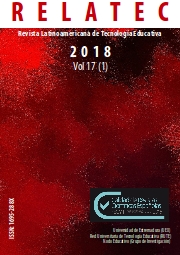Problematization methodology about sepsis in distance education: a course with the support of Maguerez’s Arch
DOI:
https://doi.org/10.17398/1695-288X.17.1.121Keywords:
Permanent Education, Distance Learning, Problematization Methodology, SepsiseAbstract
There are few courses in distance education today that implement active methodologies directed at health professionals. The objective of this paper was to build a course about sepsis developed on the Moodle platform based on the Problematization Methodology, and to apply this course as means of providing permanent education to better qualify healthcare professionals. The study is exploratory in design, uses qualitative and quantitative approach and is applied in nature. The research was conducted by the end of the second semester of 2016 at the Moodle platform of the Universidade Federal do Rio Grande do Sul, Brazil, and was completed by 12 health professionals. The results show that 91.67% of the participants were females, their average age was 31.66 years and 75% were nurses. The quantitative analysis allowed to classify the answers given by the participants into three categories and subcategories: 1. Healthcare professional (i) the assumed role and ii) the depreciation of the theme ‘sepsis’); 2. Everyday experience (i) workflow organization, ii) training process and iii)learning process and awareness of the results); and 3. Plans of action as a means of improvement (i) in service and ii) at the professional level). We concluded that distance learning methods that use active methodologies can be of great value when applied to courses in the healthcare area. The positive contributions that emerged aggregate knowledge applicable to healthcare practice of the professionals that participated at the course, to the people working in the education area and in the healthcare area, and show that the course can enable the resolution of problems inherent to the necessities of the services.
Downloads
References
Bardin, L. (Ed.). (2011). Análise de Conteúdo (1st ed.). São Paulo: Edições 70.
Bentes, M. C. B. & Kato, O. M. (2014). Fatores que afetam a evasão na educação à distância: curso de administração. Psicologia da Educação, 39, 31-45. Retrieved from https://revistas.pucsp.br/index.php/psicoeduca/article/view/26703/19353
Berbel, N. A. N. (1995). Metodologia da problematização: uma alternativa metodológica apropriada para o ensino superior. Semina: Ciências Sociais e Humanas, 16(3), 09. https://doi.org/10.5433/1679-0383.1995v16n3p09
Berbel, N. A. N. (1998). A problematização e a aprendizagem baseada em problemas: diferentes termos ou diferentes caminhos? Interface - Comunicação, Saúde, Educação, 2(2), 139-154. https://doi.org/10.1590/S1414-32831998000100008
Berbel, N. A. N. (2011). As metodologias ativas e a promoção da autonomia de estudantes. Semina: Ciências Sociais e Humanas, 32(1), 25. https://doi.org/10.5433/1679-0383.2011v32n1p25
Berbel, N. A. N. (Ed.). (2012). A Metodologia da Problematização: com o Arco de Maguerez: uma reflexão teórico-epistemológica (1st ed). Londrina: EDUEL.
Cyrino, E. G., & Toralles-Pereira, M. L. (2004). Trabalhando com estratégias de ensino-aprendizado por descoberta na área da saúde: a problematização e a aprendizagem baseada em problemas. Cadernos de Saúde Pública, 20(3), 780-788. https://doi.org/10.1590/S0102-311X2004000300015
Dellinger, R. P., Levy, M. M., Rhodes, A., Annane, D., Gerlach, H., Opal, S. M., … Moreno, R. (2013). Surviving Sepsis Campaign: International Guidelines for Management of Severe Sepsis and Septic Shock. Critical Care Medicine, 41(2), 580-637. https://doi.org/10.1097/CCM.0b013e31827e83af
Moura, A. F. & Lima, M. G. (2014). A reinvenção da roda: Roda de Conversa: Um instrumento metodológico possível. Revista Temas em Educação, 23(1), 98-106.
Pereira, A. L. de F. (2003). As tendências pedagógicas e a prática educativa nas ciências da saúde. Cadernos de Saúde Pública, 19(5), 1527-1534. https://doi.org/10.1590/S0102-311X2003000500031
Roman, C., Ellwanger, J., Becker, G. C., Silveira, A. D. da, Machado, C. L. B., & Manfroi, W. C. (2017). Metodologias ativas de ensino-aprendizagem no processo de ensino em saúde no Brasil: uma revisão narrativa. Clinical & Biomedical Research, 37(4), 349-357. https://doi.org/10.4322/2357-9730.73911
Seymour, C. W., Liu, V. X., Iwashyna, T. J., Brunkhorst, F. M., Rea, T. D., Scherag, A., … Angus, D. C. (2016). Assessment of Clinical Criteria for Sepsis: For the Third International Consensus Definitions for Sepsis and Septic Shock (Sepsis-3). JAMA, 315(8), 762. https://doi.org/10.1001/jama.2016.0288
Silveira Neves de Oliveira, F. M. do C. da, Ferreira, E. C., Rufino, N. A., & Santos, M. da S. S. dos. (2011). Educação permanente e qualidade da assistência à saúde: aprendizagem significativa no trabalho da enfermagem. Aquichan, 11(1), 48-65.
Viana, R. A. P. P., Machado, F. R., & Amorim de Souza, J. L. (2017). Sepse: um problema de saúde pública. A atuação e colaboração da Enfermagem na rápida identificação e tratamento da doença (2a Ed.). São Paulo: COREN-SP. Recuperado de http://www.ilas.org.br/assets/arquivos/ferramentas/livro-sepse-um-problema-de-saude-publica-coren-ilas.pdf
Downloads
Published
Issue
Section
License
Authors who publish in this journal accept the following conditions:
1. The Author retains copyright in the article. Upon acceptance of the article, the author shall grant to the Publisher the right of first publication of the article. with the dcoument registered with the Creative Commons Attribution-NonCommercial-NoDerivative 4.0 International (CC BY-NC-ND) license, which allows to third parties to use what is published whenever they mention the authorship of the work and the first publication in this journal.
2. Authors can make other independent and additional contractual agreements for the non-exclusive distribution of the article published in this journal (eg, include it in an institutional repository or publish it in a book) provided they clearly indicate that the work was published for the first time in this journal.
3. Authors are allowed and recommended to publish their work on the Internet (for example on institutional or personal pages) before and during the review and publication process, as it can lead to productive exchanges and a greater and faster diffusion of published work (see The Effect of Open Access).









